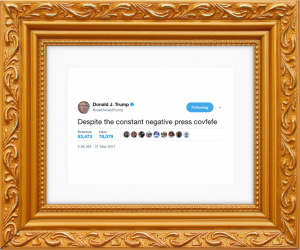 If there’s a golden rule for the online age we live in, it’s “Always assume anything you post online will be visible to all.” Just like the original Golden Rule, it’s a maxim ignored often enough to bear repeating and frequent illustration. With that in mind, let’s check in on recent developments regarding social media revealing details its users would rather conceal—bankruptcy edition.
If there’s a golden rule for the online age we live in, it’s “Always assume anything you post online will be visible to all.” Just like the original Golden Rule, it’s a maxim ignored often enough to bear repeating and frequent illustration. With that in mind, let’s check in on recent developments regarding social media revealing details its users would rather conceal—bankruptcy edition.
Deepfakes, Privacy Rights and an AI-Powered Blurring of the Lines
Recent developments in deep learning artificial intelligence have enabled almost anyone to superimpose facial features—including an entirely different face—into a preexisting video with relatively minimal effort. Until very recently, editing facial features in a video has been incredibly difficult. Even movie studios with access to professional video editing tools have struggled with the task as recently as in 2017, when actor Henry Cavill—portraying everyone’s favorite son of Krypton—sported a mustache he was contractually unable to remove during reshoots, leading to a widely criticized post-production digital shave. Because of the inherent difficulty in convincingly manipulating video to appear realistic, the public has widely been trusting of video’s authenticity while viewing still photos more skeptically. With recent developments in artificial intelligence, this thinking must now change.
10 Tips for Businesses Looking to Buy AI
 Artificial intelligence is a transformative technology–or existential threat, depending on what futurist/sci-fi author you read–that will leave few if any industries untouched when all is said and done. Still, no matter how transformed your particular business landscape, most companies that decide they need to employ AI probably won’t be AI companies themselves, which means using third-party vendors. Colleague Tim Wright has prepared some pointers on how to maximize the benefits when dealing with such vendors while minimizing the downsides (and cutting through the sales hype) on Pillsbury’s Sourcing Speak blog. “How to Buy AI: Ten Top Tips for Buying Automation Technologies” looks at some key best practices to adopt when structuring and negotiating your AI contracts.
Artificial intelligence is a transformative technology–or existential threat, depending on what futurist/sci-fi author you read–that will leave few if any industries untouched when all is said and done. Still, no matter how transformed your particular business landscape, most companies that decide they need to employ AI probably won’t be AI companies themselves, which means using third-party vendors. Colleague Tim Wright has prepared some pointers on how to maximize the benefits when dealing with such vendors while minimizing the downsides (and cutting through the sales hype) on Pillsbury’s Sourcing Speak blog. “How to Buy AI: Ten Top Tips for Buying Automation Technologies” looks at some key best practices to adopt when structuring and negotiating your AI contracts.
News of Note for the Internet-Minded – 1/31/18 – Bots, ’Bots and More Bots
Bots get purged, bots hijack the IoT, bots come to your emotional rescue and more! (There is some non-bot news, as well.)
The SEC Shuts Down Munchee’s ICO as Unregistered Securities Offering
A recent order by the SEC relating to an initial coin offering (ICO) by Munchee Inc. dealt a blow to the common practice of making a distinction between “utility tokens” and “security tokens.” In doing so, the SEC seems to also reject what our colleagues Daniel N. Budofsky and Robert B. Robbins refer to as the “magic frog” approach, the belief that a token can begin life as a security token (i.e., a magic frog) but at the point that the application and ecosystem go “live,” the token will be transformed into a utility token (i.e., the magic frog becomes a prince) and any securities law restrictions will no longer apply. In their recent client alert, “The SEC’s Shutdown of the Munchee ICO,” they examine this issue in greater detail and explore ways in which it is still possible to carry out an ICO that’s in compliance with the Securities Act.
The Algorithm Did It: The Evolving Legal Landscape of the Internet’s Favorite Tool
 In a time where “fake news” is common parlance and tensions rise in response to the smallest media slight, is it time for algorithms to take the place of humans in moderating news? This New York Times article seems to think so. What role, and to what extent, should algorithms be used in regulating and implementing everyday business ventures, government agency routine processes, health care management, etc.? Who should take responsibility in the event of a problem or negative consequence, if it is all verified by an algorithm? And, importantly, what will enhanced monitoring of algorithms do to the progress and profitability of companies whose bottom line depends on the very algorithms that can cause unforeseen, sometimes very harmful, problems?
In a time where “fake news” is common parlance and tensions rise in response to the smallest media slight, is it time for algorithms to take the place of humans in moderating news? This New York Times article seems to think so. What role, and to what extent, should algorithms be used in regulating and implementing everyday business ventures, government agency routine processes, health care management, etc.? Who should take responsibility in the event of a problem or negative consequence, if it is all verified by an algorithm? And, importantly, what will enhanced monitoring of algorithms do to the progress and profitability of companies whose bottom line depends on the very algorithms that can cause unforeseen, sometimes very harmful, problems?
News of Note for the Internet-Minded – 11/9/17 – Harry Potter Go?, Chatbot, Esq. and DARPA
Framing It Another Way: Tweets, Copyright and the De Minimis Doctrine
 When it comes to finding ways of making money, no corner of a capitalistic society shall go unmined. This applies to obvious goods and services but also comes into play with our very thoughts and how we express them. In the age of social media, not even the framed needlepoint proverb is safe from “disruption”: behold, the framed tweet.
When it comes to finding ways of making money, no corner of a capitalistic society shall go unmined. This applies to obvious goods and services but also comes into play with our very thoughts and how we express them. In the age of social media, not even the framed needlepoint proverb is safe from “disruption”: behold, the framed tweet.
Taking It Personally: One Lawsuit Tries to Hold Individuals Accountable for the Equifax Data Breach
As we discussed recently, the Equifax data breach has inevitably brought a great deal of scrutiny and legal action against the credit reporting agency. Amidst the numerous brewing class actions and other reactions from government agencies and state AGs, it’s worth pointing out another front on which the company—and more importantly, individuals within the company—may face legal consequences.
When Ripples Become Waves: The Equifax Cybersecurity Incident
Since September 7, 2017, Equifax, one of three credit rating agencies in the United States, has been dealing with the fallout from one of the largest (known) data breaches of personal information, putting 143 million Americans at risk from fraud and identity theft (roughly 44% of the U.S. population).
 Internet & Social Media Law Blog
Internet & Social Media Law Blog




